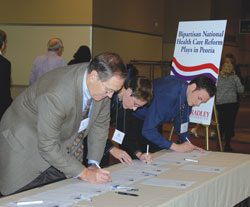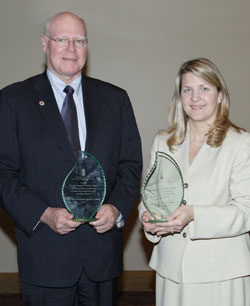
On November 14th, more than 300 current and future leaders in the health care arena attended a special public policy symposium entitled “Health Care for ALL Americans—Building a Bipartisan Coalition for Real Change.” This was the first in a series of public policy symposiums sponsored by the Dirksen Congressional Center in partnership with Bradley’s Institute for Principled Leadership in Public Service (IPL).
Twenty business, academic and health care public policy experts presented viewpoints and opportunities for health care reform at the national, state and local levels.
Importantly, the symposium was attended by nearly 100 college students from Bradley University, Illinois Central College, the Methodist College of Nursing, the University of Illinois College of Medicine at Peoria and Illinois Wesleyan University.
The morning session focused on national health care reform and included the following speakers: Dr. Gail Rosseau, chief of surgery at Neurological & Orthopedic Institute of Chicago, who spoke on behalf of U.S. Senator Barack Obama; Sally Canfield, policy director for the Romney for President campaign; Jeff Tieman, director of Covering a Nation from The Catholic Health Association of the United States; Dr. Ken Thorpe, chair of the Department of Health Policy & Management at Emory University; Glen Barton, retired chairman and CEO of Caterpillar Inc.; and Dr. Kevin O’Brien, an economics professor from Bradley University.
While each of the morning’s speakers gave different perspectives and possible solutions, there was general consensus on the following: (1) the need for bipartisan leadership to actually pass meaningful reform in Congress; (2) the need to provide access to health care for the millions of Americans who are not currently insured; (3) the need to control the spiraling costs of health care; (4) the need to dramatically increase preventative health care treatment; and (5) the need to promote healthier lifestyles. 
A highlight of the morning session was Dr. Thorpe’s presentation on a “Bipartisan Initiative on the Preventative Care and the Management of Chronic Diseases.” Dr. Thorpe is successfully shifting the focus of the health care debate from financing mechanisms and coverage concerns to the fact that 75 percent of our nation’s health care spending is tied to the treatment of chronic diseases (asthma, diabetes, heart disease and cancer). Another huge factor is obesity, which has doubled in 30 years and is responsible for 30 percent of the increase in health care costs during that period. Dr. Thorpe’s solution is to spend significantly more health care dollars on disease prevention and cost reductions through better case management. In turn, significantly fewer resources will need to be spent on the crisis treatment of chronic diseases at the end stages.
By reframing the health care debate, Dr. Thorpe helped Vermont break a legislative impasse, and the state is now pursuing a coordinated strategy on health care reform. Dr. Thorpe is also trying to bring assistance to the health care reform debate in Illinois, and many of the presidential candidates on both sides of the political aisle are embracing elements of Dr. Thorpe’s bipartisan initiative. After listening to the day-long presentations, I, too, believe that this proposal may offer the best hope for passing meaningful, bipartisan national health care reform in the next Congress.
The symposium’s keynote speaker at the University of Illinois College of Medicine’s Community Health Awards Luncheon was Thomas Donahue, the president and CEO of the U.S. Chamber of Commerce. Donahue spoke to the fact that the health care costs of Fortune 500 companies will exceed their total profits by next year, and that “For small businesses—the backbone of our economy—[they] have seen health insurance premiums outpace inflation year after year, often at a double-digit clip.” Donahue encouraged Congress to: (1) pass Small Business Health Plans so companies can pool risk and purchase coverage at an affordable price; (2) help level the taxing field by granting comparable tax treatment whether premiums are paid through an employer or by individuals in the private marketplace; and (3) pass meaningful medical liability reform.
In the afternoon, the symposium switched gears to look at state and regional health care reform and improvements. Dr. Wayne Lerner, CEO of Holy Cross Hospital and chair of the Illinois Adequate Health Care Task Force, gave a presentation on the future of health care reform in Illinois. A panel discussion followed with representatives from different stakeholder groups, including State Senator David Koehler. Unfortunately, the good work and recommendations of the Illinois Health Care Task Force, which was a bipartisan and inclusive group, got lost in the controversy surrounding Governor Blagojevich’s gross sales tax receipt funding proposal. The hope is that a more bipartisan and inclusive approach will be used to implement many of the task force’s recommendations the next time health care reform is debated in Springfield.
 Finally, Dr. Gail Amundson, CEO of Quality Quest for Health, spoke on how we can transform health care together in central Illinois. The three CEOs from the Peoria hospitals, along with Andrea Parker (Peoria County Health Department) and Joan Krupa (Heartland Community Health Clinic), then participated in a panel discussion on how we can work together to improve health care in our region. A follow-up taskforce will address these issues: (1) how medical providers can share medical records between facilities; and (2) how our region can provide better access to dental care and mental health care for those in need.
Finally, Dr. Gail Amundson, CEO of Quality Quest for Health, spoke on how we can transform health care together in central Illinois. The three CEOs from the Peoria hospitals, along with Andrea Parker (Peoria County Health Department) and Joan Krupa (Heartland Community Health Clinic), then participated in a panel discussion on how we can work together to improve health care in our region. A follow-up taskforce will address these issues: (1) how medical providers can share medical records between facilities; and (2) how our region can provide better access to dental care and mental health care for those in need.
Another take-home action item from the symposium is the launching of a nationwide, million-signature petition drive. We firmly believe that national, bipartisan health care reform plays in Peoria, and that we can lead the nation in promoting this cause. The petition simply reads:
We urge the 111th Congress and new president to work in a bipartisan manner to pass meaningful national health care reform by 2010.
Meaningful reform will:
• Provide access to health care for ALL Americans.
• Be efficient and affordable
• Seek to make this a healthier nation.
We plan to join with like-minded organizations and groups across the country and take our million-plus signatures to the White House and Congressional leaders the first week in February 2009. If you are interested in helping with this effort, please see the Institute’s web site at ipl.bradley.edu.
Whether it is on the national, state or regional levels, so much more can be accomplished in improving our health care system if we learn to work together for the common good. We need to cross party lines and break down relational barriers in Washington D.C., Springfield and in the Tri-County Region. IBI

